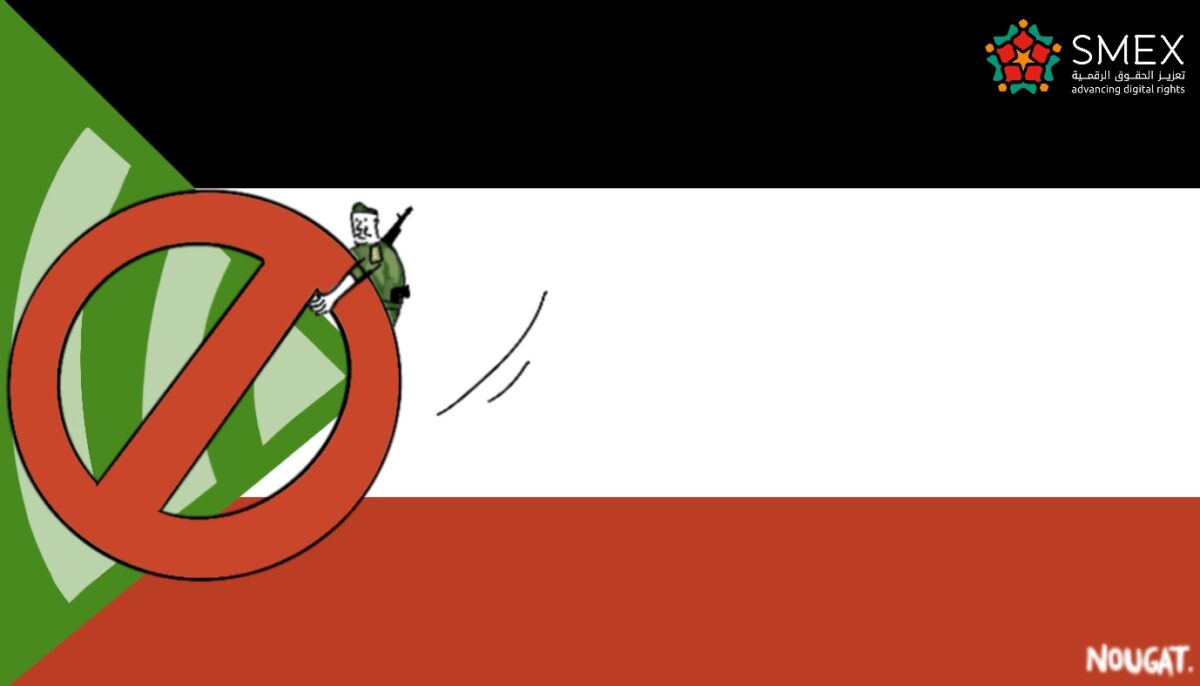Internet services have been partially restored in Sudan after a 20-day shutdown following the coup led by the Military Council on October 25. Some applications such as WhatsApp and Telegram remain blocked on certain Sudanese networks.
On the day of the November 17 mass rally, all internet and telecom services were suspended, amid reports of 15 civilian deaths and dozens of wounded, according to the Sudanese Professionals Association, which played a crucial role in the 2019 Revolution against the regime of former president Omar al-Bashir. In fact, on the evening of October 17, the Sudanese Professionals Association called upon local and international media outlets to cover the rallies and protests against the “#October_25_coup,” in an attempt to counter the internet and telecom shutdown imposed by the Military Council, “whose purpose is to spread rumors and cover up the military’s violence,” according to a SMEX source in Sudan.
On November 18, the District Court of Khartoum ordered the detention of the heads of telecom companies in Sudan until they restore internet services—suspended since October 25—to all subscribers. According to a SMEX source in Sudan, this might explain the partial restoration of internet and telecom services in the country. Other sources indicate that access to social media is very slow and difficult, unless VPN is used.
What Events Have Unfolded since October 25?
On October 25, the Commander-in-Chief of the Sudanese Armed Forces, Abdul Fattah Al-Burhan, dissolved the cabinet and Sovereignty Council and imposed a state of emergency, in what was considered a coup against the civilian government, after several previous coup attempts. As usual, internet and telecom services were the first to be suspended.
Following the 2018 December Revolution, which ousted the regime that had ruled the country for nearly 30 years, the military and civilians agreed on a power-sharing arrangement in Sudan, whereby the Sovereignty Council would act as an honorary council, while civilians and governments representatives would handle foreign relations and the resolution of internal crises, economic and otherwise. This arrangement was adopted in Sudan after the fall of the regime of former president Omar Al-Bashir, before disagreements between the military and civilian components escalated.
Sudanese authorities have long resorted to internet shutdowns on every national occasion, particularly during protests, before joining the club of nations that impose internet shutdowns “to combat fraud and cheating in examinations” in 2020. Since the 2018 #Sudanese_cities_rise protests against Omar Al-Bashir’s regime, social media, internet services in general and even the telecom network have been blocked, slowed down and subjected to all forms of repression and restriction. This did not change after the fall of Al-Bashir and his regime. The Military Council resorted to the same repressive tactic of shutting down internet services in the country in June 2019, in order to cover up the Khartoum massacre, in which hundreds of civilians were killed.
In September 2020, when internet services were suspended during the Secondary Education Exams, SMEX reported that the Military Council continued to control the telecom sector in Sudan, despite the 2019 decisions to shift control of the sector to civilian-run ministries and the Sudanese cabinet’s 2020 calls for structural reform and for expanding the Ministry of Finance’s mandate to include companies managed by the Sudanese Armed Forces.
In 2021, internet services were first suspended in June, under the pretext of the official exams, and again in October and November in the aftermath of the military coup.
Humanitarian and Economic Damages and an Ongoing Judicial Battle
The internet has become a basic service, and no one has the right to control it or deprive people of it under any pretext. Therefore, it is crucial that human rights organizations and activists continue to monitor internet shutdowns to shed light on these violations and combat them, with the aim of building a society where the values of justice, reason and humanity prevail.
The purpose of internet shutdowns in Sudan is to silence all media outlets and all calls for assembly. It also serves to cover up the acts of terror committed by militias against Sudanese citizens and their properties. This is a violation of the right to assemble, communicate and have access to information, as well as of the United Nations Human Rights Council report issued during its 32nd session.
Internet shutdowns also entail significant economic losses, not to mention that they restrict the freedom of expression and give government forces free reign to violate human rights, in the absence of evidence and recordings that document such violations. This has occurred time and again in Sudan.
Meanwhile, the Sudanese judiciary has sided with citizens. On November 9, the General Court of Khartoum ordered the “immediate restoration of internet services,” following a lawsuit filed by attorneys and the Sudanese Consumers Protection Society, according to what attorney Abdul Adheem Hassan, a friend of SMEX, told AFP. On November 11, the District Court of Khartoum issued a new judicial order requiring telecom companies to “restore internet services to all subscribers temporarily, pending the adjudication of the compensation claim.” However, telecom networks remained down, and, on the same evening, the Telecommunications and Post Regulatory Authority, acting on behalf of the military authority, issued an official statement confirming that the #telecom_shutdown would remain in force under the pretext of “national security.”
On November 14, a Sudanese court rejected the justifications made by telecom companies for failing to comply with the order to restore internet services to subscribers. Telecom companies refused to comply with judicial orders despite the fact that the Constitutional Declaration stipulates that “judicial decisions shall be binding for government entities, including telecom companies […]” and guarantees “citizens’ right to access the internet,” according to Sudanese activist Mohammad Al-Bashir.
Still, telecom companies did not comply with the judicial orders to restore services, instead opting to act based on political grounds.
On June 23, 2019, the District Court of Khartoum ruled in favor of Abdul Adheem Hassan in his lawsuit against Zain Sudan, ordering the latter to restore internet service to him until a final ruling is issued. However, the ruling made it seem as if Zain was solely responsible for the internet restriction, despite the fact that the company was acting based on government orders.
The battle against oppression and silencing in Sudan will be long and difficult. Some people are documenting internet and telecom service shutdowns and website blocking (more in this article), while others, such as attorney Abdul Adheem Hassan, are relying on the judiciary.
Support Sudan by using the hashtag #NoExamShutdown to report and discuss internet shutdowns and to call upon governments to refrain from the practice of shutting down telecom networks, as they are a human right.
You can also share ways to bypass blocking and document internet shutdowns:
Website Blocking in the Arab Region: Monitoring and Counteraction Techniques (documentation using Ooni Probe)



